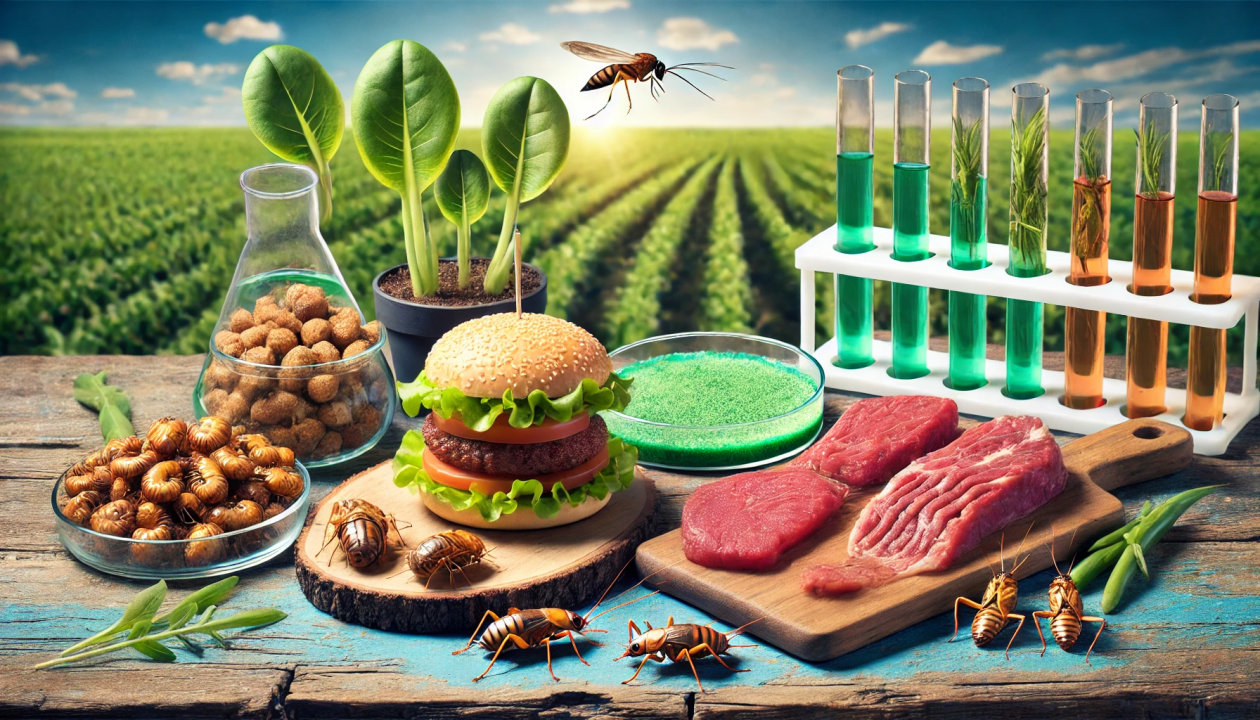
Plant-Based Alternatives: Reshaping the Future of Food
The global food industry is experiencing a seismic shift, driven by the rise of plant-based alternatives. What was once a niche market for vegans and vegetarians has now grown into a mainstream movement, transforming the way we think about food. From plant-based meats to dairy-free cheeses, these innovative products are reshaping diets, reducing environmental impacts, and redefining how we approach nutrition. But what’s behind this transformation, and why are plant-based alternatives gaining so much traction? Let’s explore the driving forces, benefits, and challenges of this food revolution.

1. The Rise of Plant-Based Foods: A Cultural Shift
The popularity of plant-based alternatives stems from a perfect storm of factors:
- Health Consciousness: Consumers are increasingly seeking healthier, nutrient-dense options to improve their well-being and reduce the risk of chronic diseases.
- Environmental Awareness: Concerns over the environmental impact of animal agriculture, including deforestation, greenhouse gas emissions, and water use, have pushed many toward sustainable eating habits.
- Ethical Considerations: Growing awareness of animal welfare issues has inspired more people to explore cruelty-free diets.
- Technological Advancements: Innovations in food science have made plant-based products more accessible, affordable, and—most importantly—delicious.
2. Key Plant-Based Alternatives Transforming the Market
The plant-based food industry has expanded beyond tofu and veggie burgers, offering a wide range of products that mimic the taste and texture of animal-derived foods.
Plant-Based Meat Alternatives
- Brands like Beyond Meat and Impossible Foods have redefined plant-based protein with products that look, cook, and taste like real meat.
- Ingredients such as pea protein, soy, and mycoprotein are used to create burgers, sausages, and even seafood alternatives.
Dairy-Free Milks and Cheeses
- Options like almond milk, oat milk, and coconut milk have gained widespread popularity, offering creamy textures and versatile uses.
- Dairy-free cheeses, made from cashews, soy, or nutritional yeast, are becoming increasingly convincing in flavor and meltability.
Egg Replacements
- Products like JUST Egg use mung bean protein to replicate the texture and taste of scrambled eggs, while aquafaba (chickpea water) is a go-to for baking enthusiasts.
Plant-Based Seafood
- Innovative companies are creating alternatives to tuna, shrimp, and salmon using ingredients like seaweed, jackfruit, and konjac root.
Ready-to-Eat Meals and Snacks
- From frozen pizzas with plant-based toppings to dairy-free ice creams, convenience foods are now catering to plant-based diets.
3. Benefits of Plant-Based Alternatives
Switching to plant-based foods offers a host of advantages that appeal to both individuals and society as a whole.
- Health Benefits: Plant-based diets are associated with lower risks of heart disease, obesity, diabetes, and certain cancers. They are also rich in fiber, vitamins, and antioxidants.
- Environmental Sustainability: Producing plant-based foods typically requires less land, water, and energy compared to animal-based products, making them a more sustainable choice.
- Lower Carbon Footprint: Animal agriculture is a major contributor to greenhouse gas emissions. Substituting meat and dairy with plant-based alternatives can significantly reduce one’s carbon footprint.
- Ethical Eating: Plant-based foods eliminate the need for intensive farming practices, reducing harm to animals.
4. Challenges in the Plant-Based Industry
Despite its rapid growth, the plant-based food sector faces several challenges:
- Taste and Texture: While many plant-based alternatives have improved significantly, some consumers still find them less appealing than their animal-based counterparts.
- Cost: Many plant-based products remain more expensive than traditional foods, limiting accessibility for some consumers.
- Nutritional Concerns: Some plant-based products are highly processed and may lack essential nutrients like vitamin B12, iron, and protein, requiring careful supplementation or fortification.
- Cultural Preferences: In some regions, plant-based diets clash with long-standing culinary traditions, making adoption slower.
5. Innovations Driving the Future of Plant-Based Foods
The industry is rapidly evolving, fueled by advancements in food technology:
- Precision Fermentation: Companies like Perfect Day are using fermentation to create dairy proteins without cows, enabling the production of milk, cheese, and yogurt.
- Cell-Based Meat: Although not entirely plant-based, lab-grown meat is a complementary innovation aimed at reducing reliance on traditional animal farming.
- Better Ingredients: Research into legumes, mushrooms, algae, and other plant sources is unlocking new possibilities for taste, texture, and nutrition.
- Enhanced Sustainability: Startups are focusing on regenerative agriculture to source ingredients while restoring ecosystems and biodiversity.
6. Plant-Based Eating Around the World
The plant-based movement isn’t limited to Western markets—it’s gaining traction globally:
- Asia: Traditional plant-based staples like tofu, tempeh, and jackfruit are being reimagined in modern ways, and new brands are expanding the market.
- Europe: Countries like Germany, the UK, and the Netherlands are leading innovation and adoption, with plant-based options widely available in supermarkets and restaurants.
- Latin America: Local ingredients like quinoa and amaranth are being used to create culturally relevant plant-based foods.
7. The Role of Individuals and Communities
The shift toward plant-based alternatives is not just about companies and products—it’s about collective action.
- Consumers: Choosing plant-based meals, even occasionally, can make a significant difference in reducing environmental impact.
- Restaurants and Cafés: Offering diverse plant-based options helps cater to a growing demand while inspiring more people to try these alternatives.
- Policymakers: Governments can promote plant-based eating through subsidies, education campaigns, and environmental policies.
8. What the Future Holds for Plant-Based Foods
The plant-based food market is expected to grow exponentially in the coming years. As innovations continue to improve taste, affordability, and accessibility, plant-based alternatives could become the default choice for many consumers. Key trends to watch include:
- Mainstream Adoption: Plant-based products are moving from specialty stores to the shelves of major supermarkets, making them more accessible.
- Blended Products: Hybrid products that combine plant-based and traditional proteins offer a bridge for flexitarians.
- Sustainability Labels: Transparent labeling will help consumers make informed choices about the environmental impact of their food.
Conclusion: A Revolution on Our Plates
Plant-based alternatives are more than just a trend—they’re a fundamental shift in how we produce and consume food. By embracing these innovations, we can enjoy delicious, nutritious meals while contributing to a healthier planet and a more compassionate food system. Whether you’re a lifelong vegan, a curious flexitarian, or simply someone looking to make more sustainable choices, the plant-based revolution has something to offer. Together, we’re reshaping the future of food—one bite at a time.







